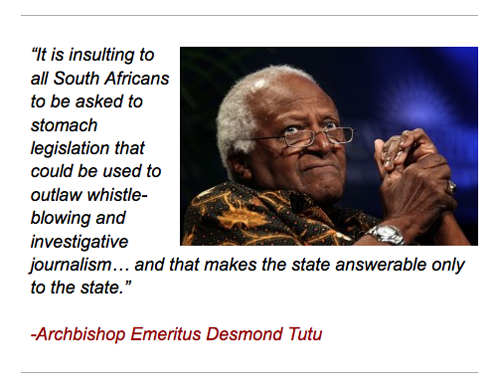South African Information Bill Could Limit Freedom of Press
by Joe Edgar / December 7, 2011 / No comments
In a 229-107 vote, the South African parliament passed the Protection of State Information Bill on November 22. The bill, if made law, would sanction unauthorized possession and publication of classified state information with a prison term of up to 25 years. The government insists the bill is designed to protect the country from espionage, but opponents of the bill say it is a step backwards for freedom of speech and democracy in South Africa, calling it a return to media censorship during Apartheid. However, according to State Security Agency (SSA) Brian Dube, “It is not correct that there will be mass classification of information as the application of the bill is narrowed drastically to national security departments.”
Despite initial agreements that the public would get a chance to weigh in on the controversial legislation, the bill was quickly pushed through parliament, leading to protests throughout the country in late November. Those protests were continued by the South African community in London this week.
South Africa’s African National Congress (ANC), the party responsible for the bill, currently holds the most seats in parliament, and is the party of president Jacob Zuma, former president Nelson Mandela, and many other anti-apartheid freedom fighters.
Critics, such as the Right2Know Campaign, have re-named the bill the Secrecy Bill and claim it is the attempt of a corrupt government to restrict the flow of information, to control the media, and to cover up official abuses. There are no protections for whistle-blowers or journalists written into the bill; instead of focusing on the harm caused by the disclosure of classified information, the wording of the bill is directed toward criminalizing the general disclosure, use, or possession of information that has been classified. With this in mind, the Nelson Mandela Centre for Memory presented several amendments, writing in a statement, “The proposals are motivated by the concern that some aspects of the bill are unconstitutional.”
The Protection of State Information Bill has been under discussion since 2008, and was proposed to parliament last year. It has two more stages of voting to go through before it reaches the desk of the president. With his signature, the law could become effective as early as January. Reporters Without Borders said in a statement last week, “While it is understandable that sensitive documents may be classified, the process should be clearly defined and limited, and should not threaten freedom of information and journalists’ freedom.”
At least 88 editors of South African newspapers signed a petition in November, and hundreds of citizens gathered in Johannesburg, Capetown, Soweto, and Pretoria to protest passing the bill. Many wore black and some covered their mouths with black tape.
Opposition leaders have called the day of protesting Black Tuesday, harkening back to the infamous Black Wednesday of 1977 when seventeen Black Consciousness organizations and publications were banned as a result of the Internal Security Act, which outlawed dissent and made it legal to imprison leaders of black organizations—including The World newspaper’s editor, Percy Qoboza.
Watch a video of the Right2Know campaign’s protest of the Protection of Information Bill






